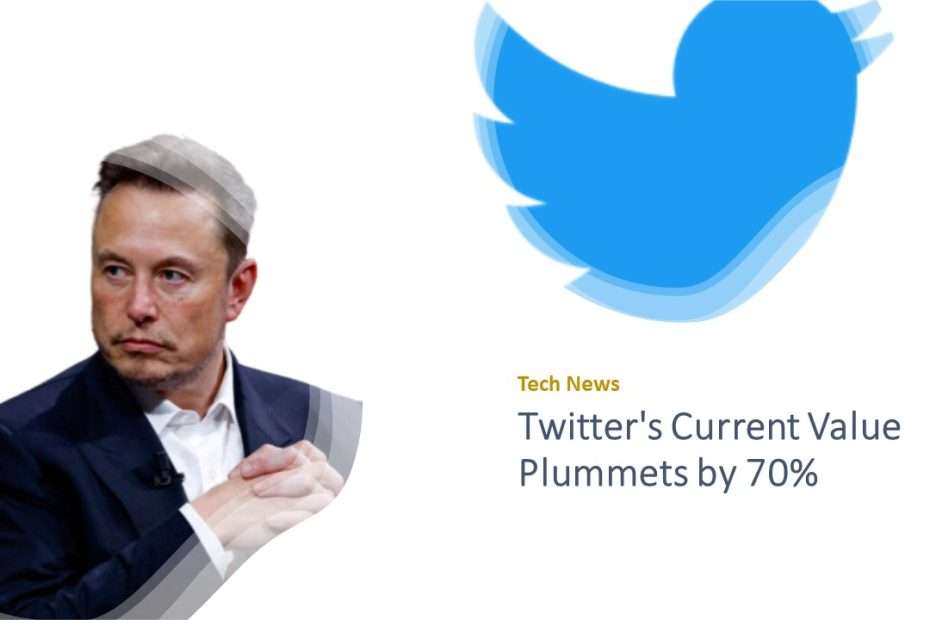Elon Musk finds himself in a challenging position as one of his major investments, X / Twitter, has witnessed a significant depreciation in value. Over the span of just over a year, the social media platform’s worth has plummeted by a staggering 70%, a situation no entrepreneur would wish to encounter. This downturn is particularly noteworthy considering Musk’s substantial initial investment of $44 billion in the acquisition of Twitter. The unsettling shift in valuation is not only a financial concern for Musk but also raises questions about the factors contributing to this substantial decline.
Adding to the complexity of the situation, the reevaluation comes from Fidelity, a mutual fund firm that played a crucial role in supporting Elon Musk’s acquisition of Twitter. The financial backing provided by Fidelity underscores the interconnectedness of various stakeholders in Musk’s investment ventures. The revaluing of Twitter’s worth by such a key player in the financial landscape emphasizes the broader implications of the platform’s declining value, impacting not only Musk but also the strategic decisions and considerations of those involved in backing his ventures. The dynamic nature of the financial markets and the ripple effects of such significant devaluations underscore the challenges and uncertainties inherent in high-stakes investment scenarios.
Fidelity, among a consortium of investors, played a pivotal role in Elon Musk’s acquisition of Twitter for a hefty $44 billion in April of the previous year. However, recent developments reveal a challenging landscape for Musk’s investment, as Axios reports a subsequent 11% reduction in the valuation of Fidelity’s holdings in X, formerly known as Twitter, by the close of November.
The latest move by Fidelity adds to the intricate tapestry of challenges facing Musk and his investment in X. The decision to further cut the value of holdings suggests ongoing uncertainties and complexities in the social media platform’s financial standing, prompting a reevaluation by one of its major backers. The implications extend beyond Musk himself, illustrating the interconnected relationships and shared risks within investment ventures involving prominent financial entities. As the financial landscape continues to evolve, the adjustments made by Fidelity emphasize the need for a nuanced understanding of the market dynamics and strategic considerations in navigating the complexities of substantial investments.
Fidelity’s most recent update on its Blue Chip Growth Fund delivers a stark assessment of Elon Musk’s company, indicating a substantial devaluation. According to the report, the current estimated worth of X is now 71.5% lower than its value at the time of Musk’s $44 billion acquisition. This significant reduction in valuation points to a challenging trajectory for Musk’s investment, as it has experienced a remarkable decrease in perceived value within a relatively short period.
In light of Fidelity’s report, the suggested valuation range for X is now situated between $12 billion and $13 billion. This reevaluation underscores the persistent downward trend in the company’s perceived worth, posing financial implications for Musk and his stakeholders. The dynamic nature of the market, as reflected in Fidelity’s assessments, raises questions about the contributing factors and challenges that have led to such a substantial decline in value for X, prompting a closer examination of the broader economic landscape and the strategic decisions surrounding Musk’s high-profile acquisition.
The decline in value for X, Elon Musk’s acquired company, encompasses a notable 10.7% reduction during the month of November. Interestingly, this timeframe coincides with an interview Musk had with the New York Times, where he addressed advertisers who had departed from X. Musk’s controversial statement to these advertisers, urging them to “go f**k yourselves“, created a ripple effect. The departure of these companies from the platform was spurred by an investigation that revealed their ads being displayed alongside pro-Nazi content posted by users. Notably, Musk directed his ire toward Disney’s CEO, Bob Iger, singling him out as a specific target for his frustration. This friction reached a point where Musk took a retaliatory step by removing the Disney+ app from Tesla vehicles.
Watch my conversation with @ElonMusk: https://t.co/YedkELVhFn
— Andrew Ross Sorkin (@andrewrsorkin) November 29, 2023
Elon Musk’s acquisition of Twitter has ushered in a period of unexpected turbulence for the social media platform. The drastic changes implemented by Musk, including the dismissal of thousands of employees, particularly from safety and moderation teams, have been a major point of contention. The restructuring not only altered the internal dynamics of the company but also had ripple effects on the platform’s user experience. Of notable concern to advertisers has been Musk’s decision to allow previously banned users back onto the platform. This significant shift, coupled with the rebranding that saw changes to the company name and logo, has created an atmosphere of uncertainty and unease among advertisers who were accustomed to a more stable and predictable environment.
The impact of Musk’s changes is further reflected in the financial realm, particularly in ad revenue. While the platform historically generated around $1 billion per quarter from ad sales, the estimated ad revenue for the entire year of 2023 has reached $2.5 billion. This significant increase in ad revenue signals a shift in Twitter’s financial landscape, but it also raises questions about the long-term sustainability of Musk’s alterations and their implications for the platform’s relationship with advertisers. As Twitter continues to navigate this transformative phase, the intersection of strategic decisions and financial outcomes underscores the challenges inherent in adapting a well-established platform to a new vision.
Maybe you liked other articles?

